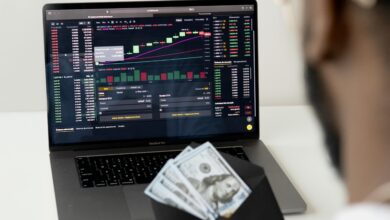Trading with the Heart: Unraveling the Emotional Triggers and Psychological Dynamics Behind Decision-Making in the Markets

In the high-stakes world of trading, decisions are often made in the blink of an eye, influenced by a complex interplay of market data, strategies, and—most critically—emotions. While technical analysis and financial metrics are essential tools for traders, the psychological factors driving their decisions can be equally, if not more, significant. Emotions such as fear, greed, and euphoria can cloud judgment, leading to impulsive trades and irrational behavior that can undermine even the most well-crafted plans.
In this article, we will explore the intricate psychology of trading, delving into the emotional triggers that shape our decisions and the cyclical nature of fear and greed within the market. We will examine how these emotions not only affect individual traders but also ripple throughout the broader market, influencing trends and behaviors on a larger scale. Finally, we will provide practical strategies for managing emotions in trading, empowering traders to cultivate a mindset that promotes rational, disciplined decision-making. By understanding the psychological underpinnings of trading, we can better navigate the emotional landscape that defines this dynamic field and strive for greater success in our trading endeavors.
- emotional-triggers:-understanding-the-psychological-factors-behind-trading-decisions“>
1. Emotional Triggers: Understanding the Psychological Factors Behind Trading Decisions
Emotional triggers play a significant role in the decision-making processes of traders, often leading to choices that diverge from rational analysis. Understanding these psychological factors is essential for anyone looking to navigate the complexities of trading effectively.
One primary emotional trigger is fear, which can manifest in various forms, such as fear of loss, fear of missing out (FOMO), and fear of uncertainty. When traders experience fear of loss, they may become overly cautious, leading them to exit positions prematurely or avoid taking risks altogether. This can hinder potential profits and create a cycle of missed opportunities. Conversely, FOMO can push traders to make impulsive decisions, entering trades without adequate analysis simply to avoid being left out of a potential winning opportunity.
Another significant emotional factor is greed. This can cause traders to become overly confident in their strategies, leading to overtrading or holding onto losing positions in the hope that the market will turn in their favor. Greed often blinds traders to objective analysis, causing them to disregard their original strategies or risk management rules.
Additionally, overconfidence can be a detrimental emotional trigger. Traders who have experienced a streak of successes may start to believe that they can predict market movements with greater accuracy than they actually can. This can lead to excessive risk-taking and a lack of critical evaluation of their strategies.
The emotional state of traders can also be influenced by external factors, such as market news, social media, and peer pressure. The rapid dissemination of information can create a sense of urgency, prompting traders to act quickly without fully considering the implications of their decisions. This environment can exacerbate anxiety and lead to impulsive reactions rather than calculated responses.
Recognizing these emotional triggers is the first step toward mitigating their impact on trading decisions. Developing self-awareness and emotional intelligence can help traders identify when their emotions are clouding their judgment. Implementing disciplined trading strategies, setting clear goals, and adhering to a well-defined risk management plan can also serve as buffers against emotional volatility. By understanding and managing the psychological factors behind trading decisions, traders can make more informed, rational choices, ultimately enhancing their performance in the market.
The psychology of trading is a complex interplay of cognitive processes and emotional responses that significantly influence decision-making. Traders often find themselves navigating a tumultuous landscape where fear and greed can dictate actions more than logical analysis. Understanding this dynamic is crucial for anyone looking to enhance their trading performance.
Emotions play a pivotal role in trading. Fear, for instance, can manifest as anxiety about potential losses, leading traders to make hasty decisions, such as exiting positions prematurely or avoiding opportunities altogether. This fear of losing money, often termed "loss aversion," can cause traders to hold onto losing positions for too long, hoping for a reversal, which can ultimately exacerbate losses. Conversely, greed can lead to overconfidence, where traders might take excessive risks in pursuit of high returns, neglecting the principles of risk management. This emotional rollercoaster can cloud judgment, making it difficult to stick to a trading plan or strategy.
Moreover, the concept of "herding behavior" often surfaces in trading psychology. Traders may feel compelled to follow the crowd, which can lead to irrational decision-making during market euphoria or panic. This herd mentality can exacerbate market bubbles or crashes, as individuals abandon their own analysis in favor of collective sentiment.
Self-awareness and emotional regulation become essential tools for traders striving to maintain a disciplined approach. Developing strategies to manage emotions—such as setting predefined risk limits, employing stop-loss orders, and maintaining a trading journal—can help mitigate the impact of emotional decision-making. Mindfulness practices and cognitive-behavioral techniques can also enhance emotional resilience, enabling traders to respond to market fluctuations with a clear mind rather than a reactive instinct.
Ultimately, acknowledging the psychological factors at play in trading can empower individuals to make more informed and rational decisions. By confronting their emotions and understanding their influences, traders can cultivate a mindset that balances analysis with emotional intelligence, allowing them to navigate the markets with greater confidence and clarity.





